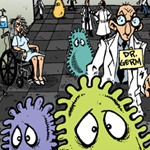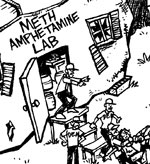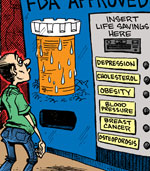Trytophan and Serotonin - Increasing Serotonin Levels Is As Much About What You Don't Eat as What You Do
| Share on Facebook | Share on Twitter | Share on Google+ |
The relationship between tryptophan and serotonin is that the amino acid tryptophan is the basic building block of the mood altering neurotransmitter serotonin. When tryptophan is digested from food, one enzyme, which is present in the brain and the digestive tract, converts the amino acid into serotonin. Another enzyme, in the liver, converts serotonin into the B vitamin niacin.
Serotonin is essential to three different body functions. It acts as an electrical conductor, conveying impulses across the gaps between neurons in the brain and the rest of the nervous system. It acts as regulator of bowel movement, speeding the passage of digested food through the lower gastrointestinal tract when toxins are detected.
And it is absorbed the blood cells known as platelets, tightening the walls of blood vessels when the platelets form a clot, helping to prevent bleeding, and raising blood pressure in the rest of the body.
Many people take tryptophan supplements, or supplements made with the biochemical derivative of tryptophan, 5-HTP, to try to increase serotonin levels in the brain to fight depression by providing tryptophan for serotonin synthesis. Just taking tryptophan or eating foods that are high in tryptophan, however, is not enough to get this amino acid into the brain.
Two other amino acids compete with tryptophan for passage across the blood-brain barrier to get into the brain. These amino acids are leucine and phenylalanine.
If you eat foods that are rich in tryptophan, or you take supplemental tryptophan or 5-HTP, levels of tryptophan inside won't go up if you also eat foods that are high in leucine and phenylalanine, or if you take supplements that provide leucine (usually identified as a "branched-chain amino acid" on the product label) and phenylalanine.
Your body has one other way to get tryptophan inside your brain, and that is to use insulin as a carrier. Eating large amounts of high-carb or sugary foods stimulates insulin production (if you are not a diabetic), increases tryptophan transport into the brain, increases production of serotonin, and may relieve depression.
This is the reason many people who have mild to moderate depression crave sweets. The problem, of course, is that eating lots of sugar to trigger release of insulin also leads to weight gain and type 2 diabetes-which are also depressing!
The best way to use 5-HTP is to take it at times when the amino acid released from the supplement does not have to compete with other amino acids for entry into the brain. Take 5-HTP on an empty stomach. To avoid serotonin syndrome, don't take 5-HTP if you also take prescription medications for depression. And if you find yourself experiencing sugar cravings, gradually up your dosage of 5-HTP.
Since your bowels also use 5-HTP, you want to be sure the supplement is being not by your bowels but by your brain. Taking 5-HTP at least two hours before or after eating other foods is the best way to ensure it is used to fight depression.
Once you get your first day's dose of 5-HTP, if brain tryptophan and serotonin metabolism increase, you will naturally have less appetite and finder it easier to go several hours without food. The better the supplements works for you, the easier it is to take it in effective doses at effective times.
-
Skin CareMen Skin Care
-
Free ResourcesFree eBooks
-
Every person is a God in embryo. Its only desire is to be born.Deepak Chopra
-
Featured Health Supplement"...I also suffer from mild-to-moderate depression, so several months ago as an experiment I ordered a few bottles of the Neuro-Natural Serenity formula, but never took it consistently. However, I started taking it faithfully last week at full dose and already my spirits are lifting and I have a greater clarity of mind."
Cathi, USA -



















